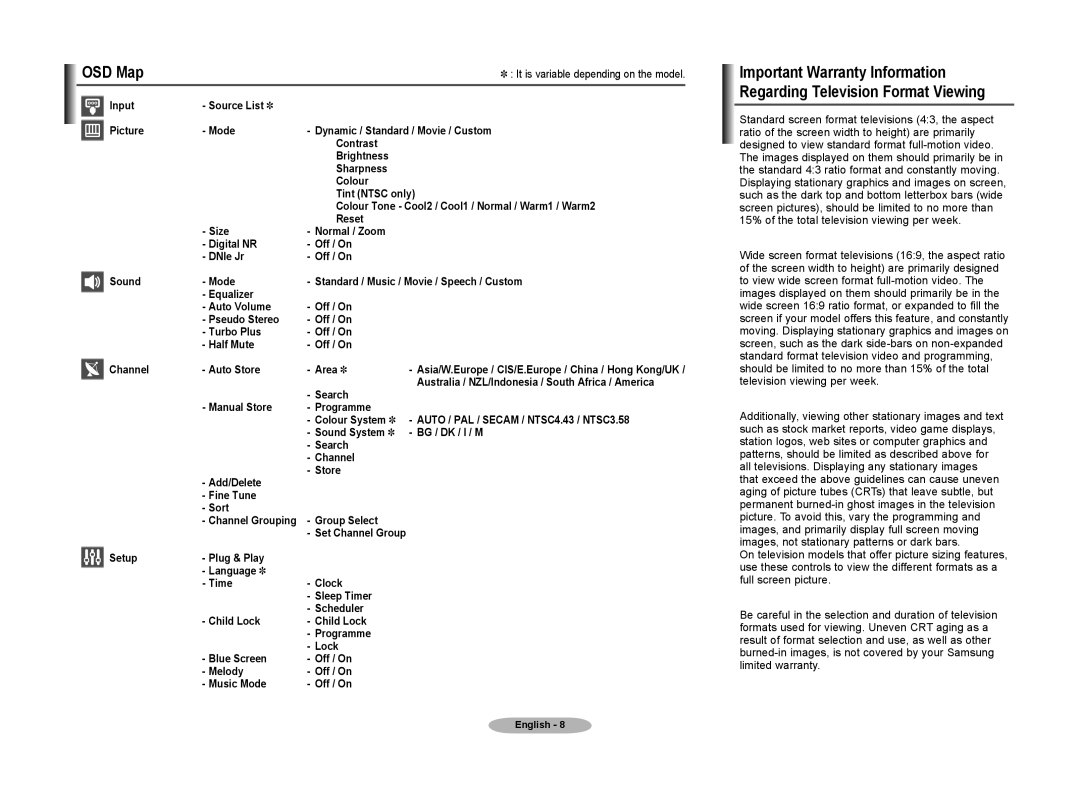
| OSD Map |
|
| ✽ : It is variable depending on the model. | |
|
| Input | - Source List ✽ |
|
|
|
|
|
| ||
|
| Picture | - Mode | - Dynamic / Standard / Movie / Custom | |
|
| ||||
|
|
|
| Contrast |
|
|
|
|
|
| |
|
|
|
| Brightness |
|
|
|
|
| Sharpness |
|
|
|
|
| Colour |
|
|
|
|
| Tint (NTSC only) | |
|
|
|
| Colour Tone - Cool2 / Cool1 / Normal / Warm1 / Warm2 | |
|
|
|
| Reset |
|
|
|
| - Size | - Normal / Zoom |
|
|
|
| - Digital NR | - Off / On |
|
|
|
| - DNIe Jr | - Off / On |
|
|
| Sound | - Mode | - Standard / Music / Movie / Speech / Custom | |
|
| ||||
|
|
| - Equalizer |
|
|
|
|
|
|
| |
|
|
| - Auto Volume | - Off / On |
|
|
|
| - Pseudo Stereo | - Off / On |
|
|
|
| - Turbo Plus | - Off / On |
|
|
|
| - Half Mute | - Off / On |
|
|
| Channel | - Auto Store | - Area ✽ | - Asia/W.Europe / CIS/E.Europe / China / Hong Kong/UK / |
|
| ||||
|
|
|
| - Search | Australia / NZL/Indonesia / South Africa / America |
|
|
|
| ||
|
|
|
|
| |
|
|
| - Manual Store | - Programme |
|
|
|
|
| - Colour System ✽ | - AUTO / PAL / SECAM / NTSC4.43 / NTSC3.58 |
|
|
|
| - Sound System ✽ | - BG / DK / I / M |
|
|
|
| - Search |
|
|
|
|
| - Channel |
|
|
|
| - Add/Delete | - Store |
|
|
|
|
|
| |
|
|
| - Fine Tune |
|
|
|
|
| - Sort |
|
|
| - Channel Grouping | - Group Select |
|
| - Set Channel Group |
Setup | - Plug & Play |
|
| - Language ✽ |
|
| - Time | - Clock |
| - Sleep Timer |
| - Scheduler |
- Child Lock | - Child Lock |
| - Programme |
| - Lock |
- Blue Screen | - Off / On |
- Melody | - Off / On |
- Music Mode | - Off / On |
Important Warranty Information Regarding Television Format Viewing
Standard screen format televisions (4:3, the aspect ratio of the screen width to height) are primarily designed to view standard format
Wide screen format televisions (16:9, the aspect ratio of the screen width to height) are primarily designed to view wide screen format
Additionally, viewing other stationary images and text such as stock market reports, video game displays, station logos, web sites or computer graphics and patterns, should be limited as described above for all televisions. Displaying any stationary images that exceed the above guidelines can cause uneven aging of picture tubes (CRTs) that leave subtle, but permanent
On television models that offer picture sizing features, use these controls to view the different formats as a full screen picture.
Be careful in the selection and duration of television formats used for viewing. Uneven CRT aging as a result of format selection and use, as well as other
English -
